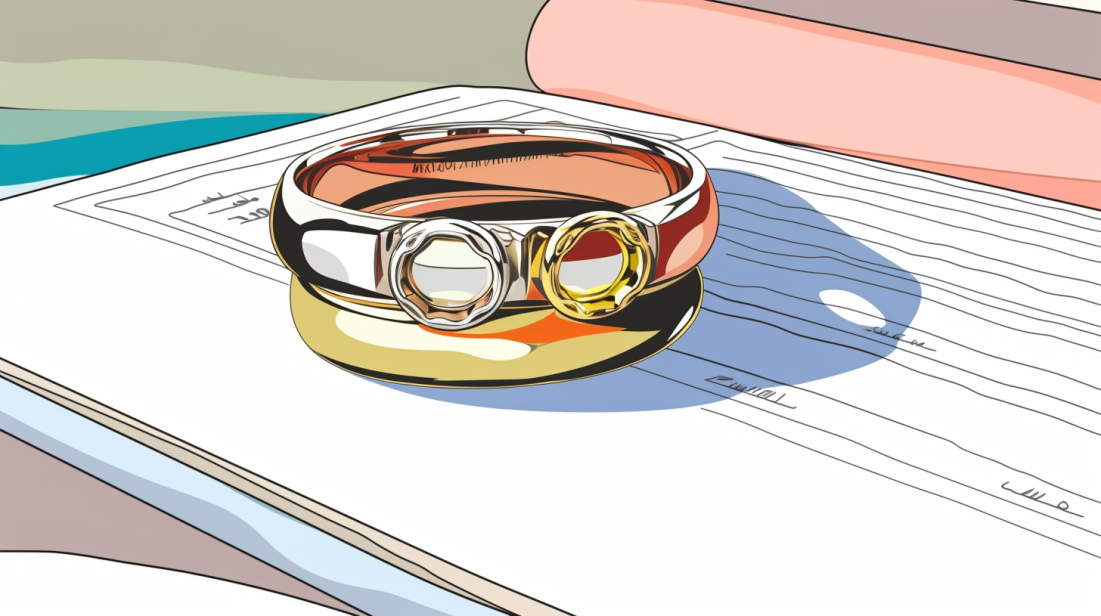How Divorce Affects Your Insurance

Key Takeaways
- Divorce can raise your car insurance costs. You need to get a new plan after splitting from your partner.
- After divorce, you may lose health coverage under your spouse’s plan. Look for other ways like COBRA or getting a personal plan to keep covered.
- Your life insurance policy will need changes too. The cash value of the policy and the beneficiary may have to be altered.
- In times of divorce, home insurance needs updates as well. It is important because it protects your things in case something bad happens.
- As per law, both partners must agree before making changes in joint policies. This covers car and home insurances mostly.
- Separate auto insurance should be done quickly after divorce takes place.
Impact of Divorce on Car Insurance
 Divorce changes many aspects of your life, and it can significantly affect your car insurance too. You might notice an increase in insurance costs post-divorce due to now being a single policyholder. It’s also crucial to revisit the legal considerations surrounding your policy; for example, if you’re not the named insured on the car insurance policy but have custody of the vehicle after divorce, you may need to obtain a new policy. The effects even extend to issues such as vehicle title and registration, which may require adjustments depending upon how assets were divided during the divorce process. Overall, understanding these impacts is key for navigating this transition smoothly.
Divorce changes many aspects of your life, and it can significantly affect your car insurance too. You might notice an increase in insurance costs post-divorce due to now being a single policyholder. It’s also crucial to revisit the legal considerations surrounding your policy; for example, if you’re not the named insured on the car insurance policy but have custody of the vehicle after divorce, you may need to obtain a new policy. The effects even extend to issues such as vehicle title and registration, which may require adjustments depending upon how assets were divided during the divorce process. Overall, understanding these impacts is key for navigating this transition smoothly.Possible Insurance Costs Increase
After a divorce, your car insurance cost might go up. This is because both people were in the plan before. Now each person has to get their own plan. The new plan might cost more than the old shared one. Changes may also need to be made based on your new status and the rules of the divorce. This could make your costs go up too.Legal Considerations for Policy
Divorce changes how you handle your car insurance. It’s vital to follow the law in every step. Both people named on a joint policy must agree to any changes. Your state may ask for proof of new insurance coverage before making changes to vehicle title and registration. You also need to think about who owns the car. If both names are on the title, it might be tough to make changes without consent from both parties. Always check with your divorce decree or legal paperwork first.Effects on Vehicle Title and Registration
Divorce means changing car papers. The person who keeps the car has to have their name only on it. This is not hard to do, but it must be done right away. It is also wise to update your address with local authorities if you move because of divorce. Next comes insurance for the car. After a divorce, each person needs their own policy if they have a car. Buying a new care or fixing up an old house can change your insurance score too.How Divorce Affects Your Health Insurance
Going through a divorce can significantly alter your health insurance plan, and understanding these changes is crucial. If you were previously covered under your spouse’s policy, the coverage may not continue post-divorce. It’s important to explore your options: consider COBRA coverage or look for an individual policy. Always keep in mind that adequate health coverage is essential for your well-being during this challenging time.Continuation of Coverage Under Spouse’s Insurance
You may still use your spouse’s health insurance after the divorce. This is possible through COBRA, a plan that lets you keep using your coverage for a while. But this only works for a short time. The court can help decide how to handle insurance in the split-up too. It’s key to make sure both people and any kids have health cover during and after the divorce process.Health Insurance Options Post-Divorce
I know that divorce can feel messy. But, it’s important to keep your health insurance in check. Here are some ways to handle your health coverage after a split:- Stick with COBRA: This is a great option. COBRA lets you stay on your ex’s work insurance for up to three years.
- Sign up for your own job’s plan: If your job offers it, use their health insurance plan.
- Buy your own policy: You can go online and buy a plan that works for you.
- Look into government help: You might get help from state or federal programs.
The Effect of Divorce on Life Insurance
 When going through a divorce, it’s crucial to reevaluate your life insurance policy. This includes considering adjustments to the cash value of your policy as well as choosing a new beneficiary if needed. Particularly for those who pay or receive alimony and child support, ensuring financial protection is vital. Additionally, securing an appropriate life-insurance policy can provide essential financial security for your children’s future in the event of untimely demise post-divorce.
When going through a divorce, it’s crucial to reevaluate your life insurance policy. This includes considering adjustments to the cash value of your policy as well as choosing a new beneficiary if needed. Particularly for those who pay or receive alimony and child support, ensuring financial protection is vital. Additionally, securing an appropriate life-insurance policy can provide essential financial security for your children’s future in the event of untimely demise post-divorce.Adjusting the Cash Value of Your Policy
If you have a divorce, your life insurance can change too. You may need to look at the cash value of your policy. This is money that has built up over time in your policy. Your spouse might want some of it in the divorce settlement. Talk to your insurance company about this big change. They can help make the changes needed so everything is fair for both people in the divorce.Changing Your Beneficiary
After a divorce, you must think about your life insurance. You might need to change the person who will get the money when you die. This person is called a beneficiary. Before, your spouse may have been that person. Now, maybe it should be your kids or another family member. Carefully pick who this will be since some policies won’t let you switch again later on!Safeguarding Alimony Income and Child Support
Life insurance plays a big role in protecting alimony income and child support. If a parent dies, it can be hard to keep up with these payments. A good plan is to keep the ex-spouse on the policy. This step helps make sure that money will come even if something bad happens. The cost of life insurance isn’t too high. It can add into monthly child support or alimony payments. This way, no one gets left without help when they need it most. Divorce might mean you have to get more coverage for this reason alone! So, having life insurance is vital to look after your kids’ needs even after divorce.Ensuring Financial Protection for Your Children
Divorce changes a lot of things, even the way you look after your kids. Life insurance plays a vital role here. It helps ensure financial safety for your children if something happens to you. You should think about changing your life insurance policy after divorce. The first step is naming your kids as the people who get the payout (beneficiaries) on your policy. This change puts them in line to get money if you die while they are still young. They will be taken care of when you’re not around anymore. Another point to consider is alimony income and child support payments that come from an ex-spouse’s work pay or assets. If these stop due to death or illness, it can lead to serious problems for custodial parents who rely on this money for bringing up their kids. So, ask yourself: Does my current life insurance provide enough coverage? Do I need more now that I’m divorced? These are crucial points to mull over when adjusting policies after a split-up.Navigating Auto Insurance During Divorce
 Going through a divorce can seem overwhelming, and managing your auto insurance may become an afterthought. However, it’s crucial to address this promptly to avoid potential legal issues related to shared or separate coverage. You need consent from your ex-spouse before removing them from the policy, which can sometimes be complicated, and could prompt the necessity for one spouse to create a new policy altogether. Timing is pivotal when separating auto insurance; waiting too long may leave you in a vulnerable position financially or legally while acting rashly could add unnecessary stress or expenses during an already challenging time.
Going through a divorce can seem overwhelming, and managing your auto insurance may become an afterthought. However, it’s crucial to address this promptly to avoid potential legal issues related to shared or separate coverage. You need consent from your ex-spouse before removing them from the policy, which can sometimes be complicated, and could prompt the necessity for one spouse to create a new policy altogether. Timing is pivotal when separating auto insurance; waiting too long may leave you in a vulnerable position financially or legally while acting rashly could add unnecessary stress or expenses during an already challenging time.Consent Requirement for Removing Ex-Spouse
If you want to take your ex-spouse off your car insurance, both of you must agree. The policy can’t end early without consent from both sides. Sometimes the divorce decree or legal papers may ask for proof of who owns the policy. This rule is in place to protect all parties involved.Necessity of a New Policy for One Spouse
One spouse needs to get a new car insurance policy after a divorce. You should not share this with your ex-spouse. Even if you both had the same insurance before, now you need different ones. It’s because when two people are married, they often share one insurance policy for their cars. Now that you’re no longer together, each of you has to have your own. It’s important that the change happens soon after the divorce gets final. Waiting can cause problems if there are any car crashes or other issues during this time. Once divorced, all links between spouses end and having separate policies show this on paper too.Timing of Separating Auto Insurance
You should split your car insurance as soon as you can during a divorce. It’s best to do this once the court decides who gets the cars. If you wait too much, it may lead to issues with claims or costs in the future. You will have to get your own auto insurance after splitting from your spouse. The time you choose for this is important, so think carefully.Updating Homeowners Insurance After Divorce
 After weathering a divorce, one crucial step often overlooked is updating your homeowners insurance. This process can require permission for changes during separation and also ensures coverage for personal items throughout the divorce phase. While emotions may be running high, taking time to address this aspect of your financial life reduces future complications and protects precious belongings from loss or damage.
After weathering a divorce, one crucial step often overlooked is updating your homeowners insurance. This process can require permission for changes during separation and also ensures coverage for personal items throughout the divorce phase. While emotions may be running high, taking time to address this aspect of your financial life reduces future complications and protects precious belongings from loss or damage.Permission for Changes to Homeowners Insurance During Separation
You need to tell your insurance company about the divorce. If you don’t, there could be problems with your coverage. You might also need to get a new policy just for you. Your partner has to say it’s okay before you can take them off the policy. Check with your insurance company about this rule. It is key in making sure everyone and everything is safe during the split-up time.Coverage for Personal Items During Divorce
Divorce makes you think hard about your personal items. Important things like jewelry or art need insurance coverage too. You may have to get a new policy if these items go with you after the divorce. Your old policy might not cover them at your new place. Costs can also rise after a divorce. The price for your house and item insurance might go up because there’s no more multi-policy discount for married couples. It’s key to talk to your insurance company when you get divorced. They can tell you how to keep your important things safe.Frequently Asked Questions (FAQs)
Navigate the uncertainties of insurance changes post-divorce with clear, concise and factual answers to common queries. Cover questions like whether continuation on a former spouse’s car insurance policy is possible, how long one can remain under an ex-spouse’s coverage, and why premiums may increase following a divorce. This section aims to dispel confusions and provide reliable information for easier decision-making during this challenging period.Can I stay on my ex-spouse’s car insurance after a divorce?
No, you can’t stay on your ex-spouse’s car insurance after a divorce. It is key to get your own policy. In most cases, the name on the car title needs to match the name on the insurance. You also need consent from both sides if you want to end an old policy before time. If teens or other drivers have been listed on your old plan, they may have to be part of new plans too.How long can a divorced spouse stay on car insurance?
A divorced spouse can stay on car insurance as long as they are named on the policy. But it’s wise to split this too during a divorce. This keeps coverage going and makes sure each person pays their own way. Changes might be needed based on who is married or divorced, what the divorce says, and who is named on the policy. After a divorce, each person must buy their own car insurance. They may also need to change the title of the car so that only one person owns it. Whether a spouse can stay insured after divorce depends on what the divorce papers say and when the new policy starts.Why did my car insurance go up after a divorce?
Your car insurance may have gone up after a divorce for several reasons. One reason could be the loss of multi-car and married discounts. Insurance companies oftentimes give price cuts to couples who insure more than one vehicle under the same policy. Another reason could be changes in your risk profile. Maybe you moved out, and your new place has higher rates due to theft or accidents in that area. The insurer also sees single drivers as a larger risk compared to married ones. This can cause your rates to rise as well. Also, if your ex-spouse had a better driving record than you do, being on their policy might have kept your premiums lower before the split. Now that it’s just you on the policy, any bad driving habits come into full view for the insurance company. Lastly, remember joint policies are often cheaper due to shared costs between both spouses. After splitting such a plan into two separate ones during a divorce, each party now bears the entire cost individually which can seem like an increase.What Happens to Your Insurance in the Event of Divorce or Separation?
What happens to your insurance coverage after death in the event of divorce or separation? It largely depends on the terms of your policy and the decisions made during the legal process. Divorce or separation can impact various insurance policies, such as life insurance, health insurance, and auto insurance. It’s crucial to review and update your insurance coverage as necessary to ensure it aligns with your new circumstances and protects your interests. Seek professional guidance to navigate this complex process smoothly.
Conclusion
 Divorce can shake up your life. It changes a lot of things, and insurance is one of them. End the worry. Get ready to make some changes in your car, health, and home insurance after divorce.
Divorce can shake up your life. It changes a lot of things, and insurance is one of them. End the worry. Get ready to make some changes in your car, health, and home insurance after divorce.





